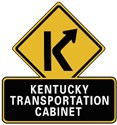
FRANKFORT – State transportation officials want to take the clunkers off the roads – but they aren’t talking about jalopies.
The officials are targeting fading, rusting and dented Kentucky license plates.
The problem is Kentucky has not issued mandatory new plates since 2005, said Department of Vehicle Regulation Commissioner John-Mark Hack during yesterday’s meeting of the Interim Joint Committee on Transportation. He added that most license plate manufacturers do not guarantee their plates for more than five years.
Besides giving the state a bad image, Hack said the old plates are compromising public safety because they are hard to read. Sen. Dorsey Ridley, D-Henderson, asked if automatic license plate readers used to collect tolls on some Louisville-area bridges were also having a hard time reading the plates. Hack said that was correct.
Kentucky collects a 50-cent fee when vehicle owners renew a registration to fund the issuance of new plates, but Hack said the state used the money to balance the general fund in recent budget cycles.
Hack said he wanted to use the issuance of new plates as an opportunity to modernize Kentucky’s license plate manufacturing process and save taxpayer money.
“The production system we use is literally a relic of the 1960s,” he said. “We couldn’t sell this production system to Somalia if we wanted to. There is not a market for it.”
Hack proposed replacing an antiquated system where Kentucky’s 120 clerks manually order embossed license plates stamped out by state prisoners with a private company that would produce license plates on demand using thermally applied decals on aluminum sheeting.
Sen. Albert Robinson, R-London, and Rep. Kenny Imes, R-Murray, both asked what would happen with the prisoners who now make state license plates.
Hack said any company awarded the contract to make the plates would have to continue to employ prisoners in the manufacturing process. He said the downside was 10 people could operate the modern equipment instead of the 55 people currently needed. Those learning to use the modern manufacturing equipment would be gaining an employable skill, he added.
Each new plate would cost $3.75 to produce, Hack said. It currently costs $3.98 to produce a standard plate and up to $5.50 for a specialty plate.
Hack estimated the state would save $320,694 annually by privatizing the manufacturing of the plates. In response to a question by Rep. Ken Fleming, R-Louisville, Hack said that figure is a little less than 1 percent of the total annual road fund budget.
“There is no amount of money too small to be saved when it comes to the condition of the road fund today,” Hack said. “We are counting pennies in the transportation cabinet so we can maximize investment in construction and maintenance of roads and bridges.”
Fleming also asked what it would cost taxpayers to modernize the manufacturing process. Hack said the company awarded the contract to produce the plates would be responsible for paying for any costs associated with modernizing the system.
“There would be no upfront costs to Kentucky,” he said.
Anderson County Clerk Jason Denny testified that he toured the private facility that manufactures Indiana’s license plates. What was memorable was the tight security at the facility.
“This was like Fort Knox secure,” Denny said. “I’ve never seen anything like it. You would have thought you were going in to see the President of the United States with body armor all around you and airlock chambers and doors.”









